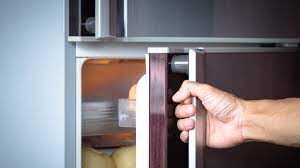Close your fridge doors and freeze your electricity bills

Close your fridge doors and freeze your electricity bills.
It’s true: Leaving the door open while you put away groceries or search for a snack is costing you.
Believe me when I tell you… Close your fridge doors and freeze your electricity bills.
Keeping the fridge door open while you decide what you want to eat may not seem like a big deal, but that open door accounts for 7% of the appliance’s total energy use, according to Home Energy Magazine
Also, helps the world to save and keep the environment in good shape.
When you open your refrigerator, the cold air that keeps your food fresh escapes and is replaced by warm air from the room. Your refrigerator’s compressor has to then drive the warm air out and bring the temperature back to normal, elevating not only your monthly energy bill but also your environmental footprint.
Check and close your fridge doors and freeze your electricity bills.
The Institute of Food and Agricultural Sciences at the University of Florida says that being careless with opening and closing your fridge door wastes 50 to 120kWh a year. To put that into perspective, 50kWh of energy could run your dishwasher 20 times and 100kWh could run your washing machine 50 times — almost a free load of laundry every week for an entire year.
Good maintenance on your fridge and great hints for keeping your doors closed.
If you can’t afford to replace your refrigerator or freezer, there are still some things you can do to make your existing refrigerator or freezer run more efficiently.
- Take Its Temperature
Check the temperature of your refrigerator and freezer with a thermometer. Set them to whichever setting allows the refrigerator temperature to remain between 35 and 38 degrees, and your freezer between 0 and 5 degrees. A refrigerator set 10 degrees colder uses up to 25 percent more energy.
- Clean the Coils
Clean the condenser coils at least once a year. Be sure to unplug the unit and carefully brush or vacuum the coils. This could improve your refrigerator’s efficiency by 30 percent.
- Don’t Forget to Defrost
Refrigerators that do not have an automatic defrost setting typically use less energy than other refrigerators, but they must be manually defrosted to maintain efficiency. It is good practice to manually defrost whenever ice becomes 1/4 inch thick.
- Regulate Room Temperature
Refrigerators can use 2.5 percent more energy for each 1 degree over normal ambient room temperature (70 degrees). This means your refrigerator could use 22 to 25 percent more energy in an 80-degree room, and 45 to 50 percent more in a 90-degree room. Your refrigerator may also use more energy if it is near an oven or dishwasher. On the other hand, if the air temperature of the room falls below 40 degrees, the thermostat may not run its cooling and defrost cycles appropriately.
- Sweat & Save
Refrigerators not only work to cool your food, but they also heat the area around the door seal to prevent condensation — the anti-sweat feature. This requires 5 to 10 percent more energy use. Check to see if your refrigerator has a power-saving switch that limits the amount of time the anti-sweat feature is enabled. Turn off the anti-sweat function when it is not needed.
- Make Room
Make sure there are a few inches of space between your refrigerator and the wall to maintain good air circulation. This will help your refrigerator run more efficiently.
- Test the Seals
Your refrigerator could be wasting a huge amount of energy if the seals are worn or loose. To check this, close a dollar bill between the door seal and the door. Repeat at different locations along the door edge. If your dollar bill moves easily, your seals are likely not tight enough and you should consider replacing them.
- Practice Smart Habits
Not only will these tips give your refrigerator a rest, but they will help you break the cycle of forgotten, spoiled leftovers.
- Open your refrigerator less frequently
- Let hot foods cool before moving them to the refrigerator
- Cover foods
- Label leftovers
- Keep your freezer full
- Keep Your Appliance Comfortable
When leaving your home for an extended period in the summer, set your thermostat to a high temperature (the EPA recommends 85 degrees), but not off. Your refrigerator works much harder in a room with a high ambient air temperature. Close your fridge doors and freeze your electricity bills.
Cheapest electricity service in Texas
Check our Power Blog for more ideas on how to save energy


 Español
Español